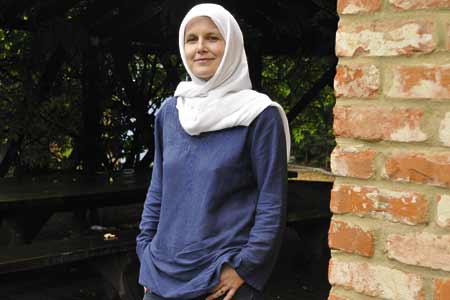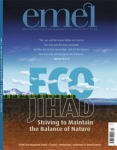
The Material World
Issue 85 October 2011
“Rivalry for worldly gain distracts you, until you visit your graves,” counsels the Qur’an. Lucy Bushill-Matthews reflects on our excessive urge to acquire more and more...stuff.
One of the enduring images of the recent riots in the UK must be the looters queuing up to try on stolen trainers for the right size. The riots that were sparked off by a sense of injustice quickly spiraled into a frenzy of greed and destruction. Targeted shops included those that sold ‘must-have’ items — mobile phones, fashionable clothes, the latest trainers, flat-screen TVs. Descartes is best known for saying, ‘I think therefore I am,’ yet one report on the riots suggests the UK marketing companies are far more intent on pushing a more commercial message, ‘I buy, therefore I am.’
The drive to acquire is not just amongst those who cannot afford it—and it can start early. When my daughter was four, her Granny promised her one present from Toys-R-Us. My little girl rushed into the shop and proceeded to pile up so many toys as possibilities that she was almost paralysed by the choice—and, having chosen one, almost immediately regretted her decision, thinking that one of the alternatives would have been just what she needed. As adults, most of us are still piling up our possessions. One keen consumer waiting for his iPad 2 near the front of a mile-long queue in New York said, “I held off as long as I could [before buying the first iPad] but ... this product has created its own need.” Millions would agree to that sentiment.
Annual celebrations are now commercial occasions to create more needs for us to satisfy, either for ourselves or for the ones we love. The original Mother’s Day in the US was to mobilise outraged mothers to keep their sons and husbands from going off to die in unnecessary combat. The UK’s Mother’s Day began with the Christian practice of visiting one’s mother church. Yet in both countries, it has now become another giant marketing extravaganza. Fortunately, my children do not yet have their own access to the shops—so last Mother’s Day, my seven-year old treated me to breakfast of an apple, an orange and dry cereal along with a very obviously homemade card. I ate the fruit, found milk for my cereal and still treasure the card. I wondered how long my own Mother’s Day experience will manage to at least be a day of thoughtfulness rather than yet another day of buying to prove one’s love.
The run-up to Christmas is now well known to be the UK’s main shopping season of the year — a scenario Mary mother of Jesus could never have imagined when she came home to her community with her miracle son. And despite the spiritual emphasis of Ramadan, Muslims are not immune: in countries with large Muslim populations, there is a proliferation of ‘Ramadan sales’ and ‘Eid specials’. In South Africa this year, Muslims were keen to avoid such consumerism—so we instead hosted a huge Eid Shopping Festival just before Ramadan started, an event which aimed to be ‘the hottest event for the whole family.’
The extremes to which we have taken consumerism are unprecedented. The average European now uses some 43kg of natural resources daily, while the average US resident uses nearly 90kg. According to Worldwatch’s State of the World 2010 Report, our planet can indeed support US consumption levels—but only if the global population was just 1.4 billion people.
While the scale of today’s materialism may be new, the issue itself is not. All the major faiths discuss combating materialism through similar exhortations of simplicity, self-restraint, and—of particular importance — frugality. There are simple steps we can all take to reduce our ecological footprint: reducing food wastage, minimising the use of paper and plastic bags, cutting down on take-a-ways, and so on. However, the most important step is to change our attitude and focus on finding satisfaction elsewhere rather than in the shops.
Islam, Christianity, Judaism, Buddhism, and Hinduism all teach us to be satisfied with less. Jainists take this concept particularly seriously. Satish Kumar, editor of the environmental magazine Resurgence, describes their approach, “Every morning after meditation, practicing Jains put a limit on the number of items they are going to eat or wear, the distance they will travel, and the things they are going to purchase. Their aim is to reduce their consumption from the previous day, and find satisfaction using a few things well rather than many things carelessly.” The Talmud advises Jews to pray intercessory prayers over goods that have become dangerously cheap—a situation that encourages us to buy too much at prices that do not allow a fair wage for the seller or maker.
We have a number of Prophetic examples to militate against consumerism. In the sayings and deeds of Jesus passed down from generation to generation and gathered by Al-Ghazzali, it is related that, “Jesus used to take nothing with him but a comb and a jug. Then he saw a man combing his beard with his fingers, so he threw away the comb; and he saw another man drinking from a river with the palms of his hands, so he threw away the jug.” He is also reported to have said, “At night I have nothing, and in the morning I have nothing, yet there is no one on earth richer than I.”
Prophet Muhammad also demonstrated the concept of frugality in his own daily life. One of his closest Companions, Umar, came into the house of the Prophet to find him lying on a rough mat that left marks on his body. Umar started to sob. “Why are you crying so? O Umar,” asked the Prophet. “I thought of Caesar and Chosroes sitting on thrones of gold, wearing silk. And you are the messenger of God, yet here you are lying on this simple mat.” “O Umar,” consoled the Prophet, “are you not satisfied that they have this world and we have the next?”
Within Islam, acquisition of wealth is allowed, and is purified through the compulsory giving of zakat to the more needy. However, hoarding wealth remains strongly discouraged. Personally, I am not prepared to live without even a jug or a comb, nor do I want to give up my comfortable mattress — but I do at least (much to my husband’s amusement and slight consternation) regularly scour each and every cupboard at home to check that we ‘need’—or rather use—everything we have.
Whether we are racing as part of a gang to find a pair of designer trainers or simply racing through Toys-R-Us with our own credit card, it is clear that our current approach is neither sustainable nor desirable. We must constantly strive to balance our desire for the ‘good things’ in this life with a focus on the Hereafter. The Qur’an reminds us, “Do they think that by giving them wealth and children We race to give them good things? They really have no idea! Those who stand in awe of their God, who believe in His messages, who do not ascribe partners to Him, who always give with the hearts that tremble at the thought that they must return to Him, they are the ones who race towards good things, and they will be the first to get them.” (23:55-61)
Lucy Bushill-Matthews is author of ‘Welcome to Islam — a Convert’s Tale’.
Bookmark this |
|
Add to DIGG |
|
Add to del.icio.us |
|
Stumble this |
|
Share on Facebook |
|
Share this |
|
Send to a Friend |
|
Link to this |
|
Printer Friendly |
|
Print in plain text |
|


Comments
1 Comment
1
Richard Boeke
15 Oct 11, 12:53
Thank you for your thoughtful essay on the virtues of simplicity.
In our Unitarian tradition we are inspired by Henry Thoreau who wrote WALDEN and taught SIMPLIFY, SIMPLIFY. He also spent a night in jail and wrote AN ESSAY ON CIVIL DISOBEDIENCE which inspired Gandhi and Martin Luther King, Jr, and still inspires many to day who are marching for less GREED and more response to NEED.
I am forwarding your essay to Unitarian John Naish. His book ENOUGH has much in common with your essay.
We are planning an Interfaith Dialogue which will touch on this challenge at London Central Mosque the afternoon of 7 December. By 1 November, I hope to have the details on and
Blessings and hope, Richard Boeke
Chair, British Chapter, International Association for Religious Freedom (IARF).